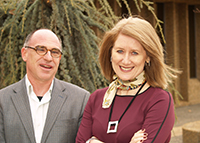Glezakou and Rousseau to Lead Symposium at National Conference
Understanding how chaos and other factors affect energy and environment
(March 2016)

Dr. Roger Rousseau (left) and Dr. Vanda Glezakou at Pacific Northwest National Laboratory organized a two-day event that will bring together experts to exchange ideas, methodologies, and applications for simulating the interfaces between solids and liquids.
Whether forming clouds, storing carbon dioxide, or producing zero-emission fuels, the reaction occurs at the point where a solid and liquid meet. At the interface, the molecules involved don't behave as expected. The rules for molecular interactions differ from the more well-known interface between a solid and a gas. Scientists have created computational, or theory-based, approaches that have shed new light on the solid-liquid interface. Dr. Vanda Glezakou and Dr. Roger Rousseau from DOE's Pacific Northwest National Laboratory have brought experts on this research for a two-day symposium.
The symposium will provide an opportunity for researchers to learn about new ideas and debate future directions with experts from the United States, England, Switzerland, and Italy. Methodologies and different approaches to studying interfaces will be discussed.
For example, Prof. Michele Parrinello from ETZ Zurich in Switzerland will share his insights on path integral metadynamics. Other prominent researchers will also discuss their results and ideas, including Prof. Guilia Galli from the University of Chicago discussing solar interfaces, Prof. Horia Metiu presenting results on solid-water interfaces, Prof. Annabella Selloni from Princeton University talking about her recent findings in catalysis, Prof. Priya Vashishta from the University of Southern California talking about billion atom molecular simulations, and Prof. Gregory Voth from the University of Chicago talking about the relative presence of protons and hydroxides in water, to name just a few.
Both organizers have been active in incorporating advanced simulation of reactivity and speciation in complex interfaces in both basic and applied research areas of DOE's portfolio of programs. Glezakou organized the symposium to encourage a spirited exchange of ideas around computational chemistry. She is a computational chemist who has worked at the national laboratory for a dozen years. Her research currently revolves around carbon dioxide chemistry, which is relevant to carbon capture and sequestration along with catalytic transformations.
Rousseau is well known for his expertise in applying theory and computation to interfacial reactions of interest to catalysis and beyond. He's worked closely with his colleagues in DOE's EMSL, an Office of Science scientific user facility, where he's integrated theory and experiment towards understanding reactivity at complex interfaces. He organized the symposium to showcase the advances theoretical chemistry can bring to experimentalists.
In addition to Glezakou and Rousseau, several other PNNL scientists will be giving talks at the seminar:
- Yang-Gang Wang, Classical, molecular-dynamic simulations on water/phenol speciation at the surface-liquid interface
- Mal-Soon Lee, High temperature properties and anharmonic effects from ab initio molecular dynamics simulations
- David Cantu, Computational modeling of electrochemical bio-oil upgrading
- Amity Andersen, Interactions of biogenic organic molecules with soil minerals and ionic species: An atomistic overview
- Other contributing authors include Mike Lilga, Asanga Padmaperuma, B. Pete McGrail, Wooyong Um, and Robert Weber.
The symposium, titled "Structure, Dynamics and Reactivity at Complex Interfaces with Relevance in Renewable Energy and Environmental Applications," will begin Sunday, March 13, at the San Diego Convention Center in California as part of the Spring 2016 National Meeting of the American Chemical Society.
